Your holidays are the period of time when you are most susceptible to scams, since you are more vulnerable than during your daily life.
When travelling, we are often in an unknown place and there are many things to think about, like getting your bearings, explore the different locations, trying to speak the local language and unfortunately we very often forget the basic safety rules.
Portugal, even though it’s a safe country, like all countries, has its share of scams.
Disclosure: This post may contain affiliate links, meaning i get a commission if you decide to make a purchase through my links, at no cost to you. Please read my disclosure for more info.
In order for your stay in Portugal goes smoothly, I will tell you in this article about the most common scams and I will tell you how you can defend yourself if you are confronted with any of them.
Most common scams in Portugal
1. Taxis
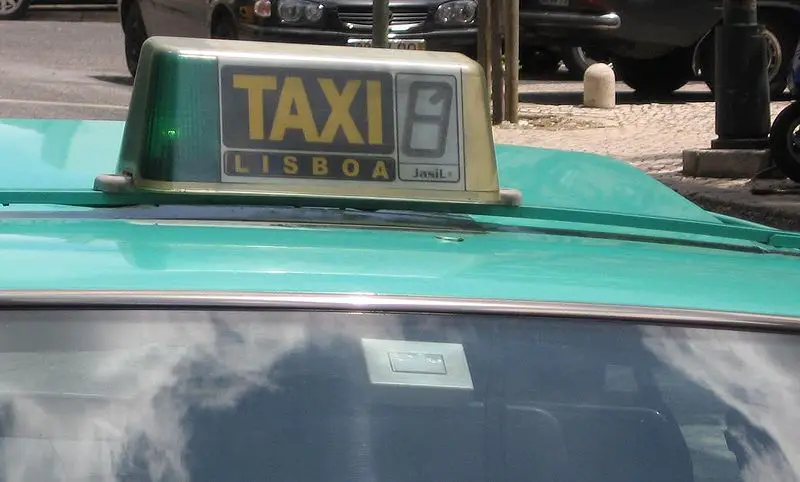
One of the most common taxi scams is to offer a package instead of turning on the meter, telling you it’s cheaper or the meter is out of order. Know that taxi drivers are under the obligation to turn on their meter for any journey made, if they refuse change taxi.
A trip from Lisbon or Porto airports to the city centre costs on average 15 € – 20 €, plus an additional € 1.60 must be added to this price per piece of luggage carried.
The other way to increase the cost of the ride is to take a much longer route or “lose themselves” on the streets of the city centre.
Before leaving for Portugal, look on Google Maps for the distance and time it takes from the airport to your hotel. This way, when in the taxi, ask the driver how much does it cost on average to travel to your destination. This will allow you to check whether the driver intends to overcharge you!
2. Hiring a car
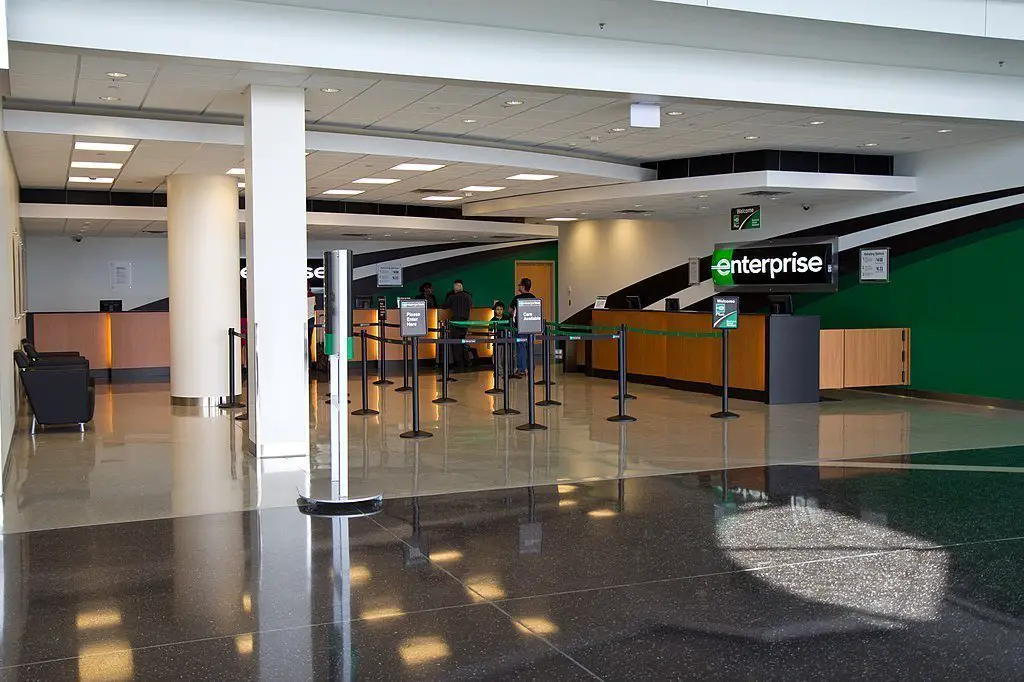
Car rental scams can cost you a lot… To avoid being tricked, read the conditions carefully when hiring a car.
Pay attention to the low prices, they often hide unpleasant surprises, as is the case with hiring a car with the empty tank.
Car hires with the option “return the vehicle with the empty tank” are cheaper when hiring, but when you go to pick up your vehicle, you will pay an exorbitance for fuel, then you have to return your vehicle with the empty tank (it is not an obligation, but you will lose the money of the fuel remaining in the tank).
As you probably know, in Portugal there are two types of motorways, the conventional tolls (as in the UK) and the electronic tolls.
If you use electronic toll motorways with your rental car, you will have to go to the Portuguese Post Office (CTT) to pay the tolls due. The problem is that you have to wait 1 day for the tolls due to appear in the system. In addition, to get to some airports (Porto, Faro), it is very difficult to avoid these motorways.
Some rental companies are taking advantage of this problem to charge their customers a higher price for their passage on electronic toll motorways.
To avoid unpleasant surprises due to unpaid tolls when returning from your stay, when hiring a car or on site, choose the option electronic device (Via Verde), which will allow you to pay the tolls when you return drop off the vehicle. The device costs on average 1.80 € / day, with a maximum of 18 €.
To find out all my suggestions for hiring a car without getting ripped off, read this article.
3. Restaurants

In Portugal, when you arrive at a restaurant, the waiter will immediately serve the appetisers (bread, butter, small cheeses). Know that these appetisers will be charged, around 2/3 € for the bread and 1/2 € for each little butter.
Pay attention to this point since some restaurants won’t hesitate to serve much more expensive appetisers and charge you for appetisers you didn’t eat. If you don’t want appetisers, tell the waiter as soon as he arrives with them or ask for the price if it is not displayed on the menu.
Information: to avoid any misunderstanding with tourists who are not used to this Portuguese custom, more and more restaurants in touristy places no longer serve appetisers without the client telling so.
Another scam common in some restaurants is to attract customers with inexpensive outside menus, then, once at the table the waiter suggests “regional” or “daily” dishes. By the end of the meal, you realise that the prices of these dishes are much more expensive than those you had seen.
Tip: when you are offered dishes that you have not seen the price, always ask the waiter how much each dish costs or ask him to show you the dish in the menu.
When you visit very touristy places, avoid eating in restaurants where waiters approach customers by the door, they’re often restaurants of average quality with prices higher than normal.
4. Visa/Mastercard credit cards

To avoid paying excessive commissions, many small businesses (restaurants, hairdressers, small shops, etc.) do not accept foreign Visa / MasterCard cards.
As a general rule, you will see accepted bank cards at the entrance of the establishment. When businesses don’t accept foreign bank cards, you will see the MasterCard or Visa logo with a red cross and next to it the Multibanco logo, the Portuguese payment network which is accepted almost everywhere.
When the Multibanco logo has a red cross, it means that the establishment you’re entering does not accept any bank card. When this is the case, in addition to not wanting to pay commission for each sale, there is a good chance that the owner does not wish to declare all his income to the Portuguese state…
Note that in Portugal, all businesses are obliged to ask the customer if he wants an invoice. If they don’t, they risk a heavy fine if they’re audited. The question the seller will ask you is if you want to include the “taxpayer identification number” or “NIF” (this is the Portuguese taxpayer number).
If you want to include your tax number, you will have to give your Portuguese tax number (for those who live in Portugal), or that of your company (Portuguese or foreign). For individuals living abroad, it is useless to give their tax number.
Advice: to avoid any problem during a payment, always have some money on you – 50 € – 100 € is enough and if you need more, just withdraw prior to your purchases at one of the many ATMs.
Since 2015, there are two networks of ATMs in Portugal: the Portuguese network Multibanco and Euronet.
If you have a credit card, choose ATMs from the Portuguese Multibanco network, because with Euronet you will have to pay a commission for each withdrawal (after entering the code and the desired amount, the distributor will inform you how much is the commission – you can cancel the transaction at that time).
By using the Multibanco network to withdraw money you will never pay a commission (check with your bank anyway, if you have to pay a commission in the euro zone).
Information: when paying tolls, foreign cards may be refused (especially in automatic tolls). Always carry change and / or 10 or 20 euro-banknotes.
5. Pickpockets

As in all countries, Portuguese tourist spots are very popular among pickpockets, especially in crowded public transportation, such as the Lisbon and Porto trams.
To avoid any problems, avoid having a lot of cash on you, high-value goods (jewelry, expensive watches, etc.), never put your wallet in the back pocket of your pants and never leave your handbag open.
In addition to Portuguese pickpockets, in recent years there has been an influx of international thieves (especially in summer), in most cases, the same networks are active in Paris, Madrid, or Barcelona.
In addition to public transportation, thieves target cars with a foreign license plate or those that are rented (there is always a sticker advertising the rental company…). It is therefore very important not to leave valuables in your car.
Before your departure always make a photocopy of your identification papers and put them on your email box, Dropbox or Google Drive, which will allow you to prove your identity abroad thus saving you from some problems.
Another type of scam is the sale of underpriced tickets for football matches, museums or monuments. Always buy tickets at official ticket offices or online.
Information: pickpockets are especially common in the Lisbon, Porto and Algarve regions in summer. Even if zero risk does not exist, everywhere else in Portugal there is very little chance of pickpockets stealing you, because they prefer the most touristy and crowded places.
How to defend yourself when faced with scams in Portugal
Were you a victim of a scam / theft from an individual (pickpocket)?
You will have to go to the nearest police station of PSP or GNR to file a complaint.
Unfortunately, in many cases, the police cannot find the thief, but you still have to file a complaint to have the stolen goods reimbursed by your insurance company.
I know it is discouraging to go and file a complaint knowing that there is little chance that the thief will be caught, but you still have to go so that the police can build a file, know their MO and start monitoring the area where the theft took place.
Were you a victim of a scam from a company (restaurant, car rental company, etc.)?
If you are not satisfied with a service, a product purchased or you were a victim of a scam from a company, you can defend yourself with the Complaints Book (Livro de Reclamações in Portuguese).
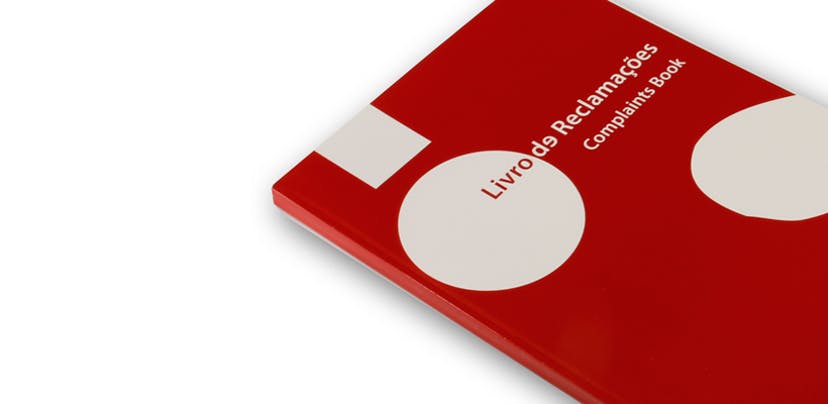
All companies in Portugal that welcome customers (restaurants, bars, banks, car rental companies, post office, etc.) are obliged to have the “Livro de Reclamações” in their establishment.
The first step in the event of a dispute is to inform the company of your dissatisfaction so that the problem is resolved. If, after this first attempt, the result is not conclusive, ask for the “Livro de Reclamações“.
In many cases, the company will try to find an amicable solution (it risks a large fine from the regulator of its sector of activity). Sometimes there is no agreement and a complaint must be made.
You should know that the company is obliged to provide you with the complaints book. In case of refusal, you can call the police so that they make the company give you the book.
You will then have to fill out the form in Portuguese or English (I explain below, how to do it on the internet). The form has 3 sheets, one for you, another for the company to send to the regulator of its sector of activity and another which remains in the complaints book for 3 years.
If you think that the company will not send the document (it has 10 days to do so), you can send a photocopy of your copy to the address of the regulator of the sector of the company in question. The address and name are located on the “Livro de Reclamações”.
If you do not speak Portuguese and you do not live in Portugal, I suggest you make your complaint on the internet, this will allow you to do it calmly from your hotel or even when you return to your country.
Before leaving the establishment, try to find an amicable solution and do not hesitate to inform the company that you intend to file a complaint.
When leaving, make sure you have the invoice to be able to make the complaint on the internet.
Once at home or at your hotel, go to https://www.livroreclamacoes.pt/.
Click on “Fazer reclamação” or “Make Complaint” if you have chosen the English language.
Insert your email 2 times and after checking the box “Não sou um robot” or “I’m not a robot” click on “Submeter” or “Submit”.
You will then receive an email with several links. Click on the first link to validate your account and be able to make your complaint.
Then insert your first name, your last name and in “ID card type“, select your identification document: “Portuguese identification card”, “Foreign ID card” or other.
In “ID card number” insert the number of your document (driving license, identity document or passport).
If you have a Portuguese identity document, you will also need to insert the NIF (Portuguese tax number).
In “Country” choose your country. Then enter your postal address. “Street“, “Postal Code“, “Location“.
To the question “Add service address” tick “Yes” if you want to add the address where the service took place. Otherwise, tick “No“.
Then insert your phone number and tick the box “Authorise that the Residence and Contacts data are provided to the supplier” if you authorise your postal address to be disclosed to the company with which you have the dispute. This will allow the company to respond to you directly (this box is not mandatory). Then click on “Next“.
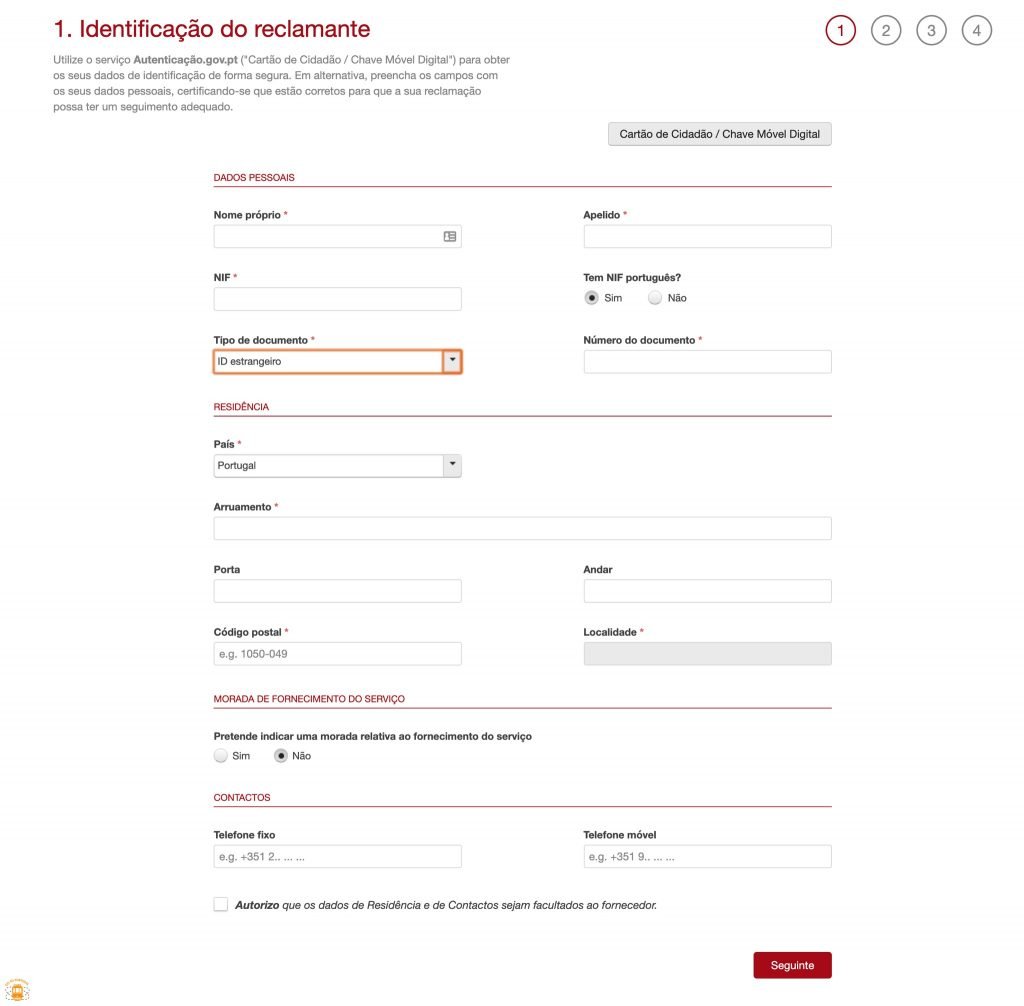
In the second step, you must insert in “Supplier search” the name of the company that appears in the invoice for the system to do a search.
Attention: you must not insert the brand, but the name of the company. Example: the brand is McDonald’s, but the name of the company that appears on the invoice is different. To avoid making mistakes, click on “Advanced” on the right of “Supplier search” and insert the NIF (company tax number) present in the invoice, then click on the magnifying glass.
Information: on the invoice, in most cases, you will see NIPC and then a number. It is this number that must be inserted in “NIF” on the form.
The system will display a result, click on it to go to the next step. In “Activity sector / Regulatory authority / Supervisory” you will choose the regulator of the sector of activity of the company in question. Typically there is only one option.
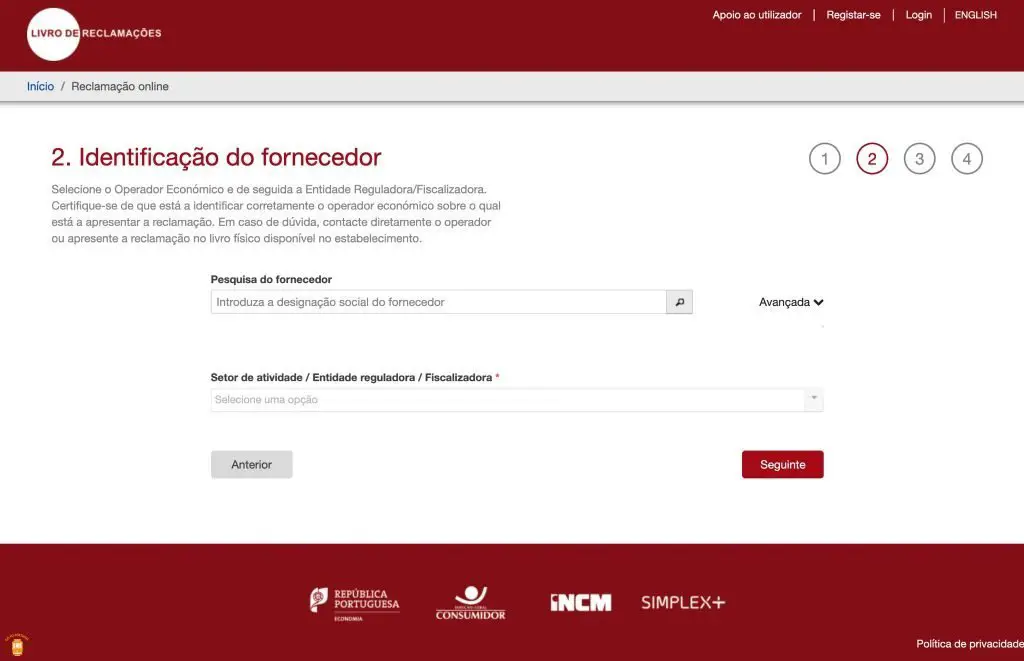
Then click on “Next” to go to the next step. On the next page, in “Assunto / Motivo Principal” you will have to choose the reason for your complaint.
The options that appear vary from sector to sector. It is therefore impossible for me to translate all the options. What I suggest you to do, if you do not speak Portuguese, is to open in a new tab the site Google Translate and translate each word to know which option to choose.
In “Motivo” you will have to specify even more the reason for your dissatisfaction (translate each option as explained above). Then in “ Complaint description” you must explain your problem with a maximum of 2000 characters.
In “Associated complaint” insert the number of the complaint made previously, if it is a new complaint associated with an already reported problem.
I suggest you add in “Attachments” (it is not mandatory, but it is a plus) a copy of your invoice, rental contract, or other document which will make it easier to understand the problem.
In step 4, you will have a summary of your complaint. Once you’ve verified the information, click “Submit”.
It will then take a few days for you to get a response from the company involved. If, after your complaint, the problem is not resolved, the entity that regulates the sector will analyse your complaint and if they notice that there is a fault on the part of the company, they will fine them.
If at some point there is a sentence which I have not translated or the form has changed, you can always insert the sentence on Google Translate.
Reading these lines, you must be thinking that it is tedious to make a complaint, especially if one does not speak Portuguese, but take a few minutes to defend yourself. If everyone who is a victim files a complaint, companies that abuse their customers will have to change their practices or close!
Are you going to visit Portugal? Then don’t hesitate to book your hotel room, your car or the best activities by clicking the links below. This way you are helping me in the development of my blog and I’ll be able to offer you free tips and travel guides so that you can better prepare your visit to Portugal. Thank you!
What will also interest you:
- Coronavirus (COVID-19) in Portugal: current situation
- How to rent a car in Portugal and avoid the sneaky extra fees
- Discover how to access the Internet in Portugal during your holidays
- Discover what is the best time to visit Portugal and prepare your trip!
- How to choose your accommodation in Portugal
- Toll roads in Portugal – learn how to pay the electronic tolls (ex SCUTS)

